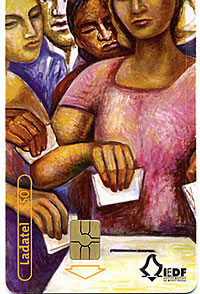 |
 |
 |
 News Around the Republic of Mexico | September 2005 News Around the Republic of Mexico | September 2005  
For Mexicans Abroad: A Presidential Election But No Campaign
 John Rice - Associated Press John Rice - Associated Press


| | "Vote!" by Raul Anguiano. Federal District Electoral Institute Get-out-the-vote campaign poster. |
Mexico City – Mexicans in the United States finally can vote in their country's 2006 presidential election – but they'll make do without the campaign, federal electoral officials said Wednesday.

Mexico's Federal Electoral Institute approved rules that that virtually ban Mexican candidates from leaving the country for fear they could violate a legal ban on campaigning for the July 6 vote.

And their parties can't spend a cent to reach the estimated 4 million registered Mexican voters abroad, the vast majority in the United States.

If that sounds like the best of both worlds for voters weary of pre-election propaganda, it's frustrating to politicians desperate to woo what is likely to be a crucial swing vote in a close three-way election.

"How can we bring information to Mexicans who live outside national territory?" asked Rogelio Carbajal, the National Action Party representative to the election institute.

"A fundamental element ... in any democracy is information," he added, arguing that some of the rules violate constitutional guarantees of free speech.

Members of the institute's board said the tough restrictions were merely clarifications of the terms spelled out in the new law that allows voting abroad for the first time.

Fearing that foreign money could contaminate Mexico's domestic election, Congress banned parties from spending any money abroad or doing any "activities, acts and electoral propaganda" during the campaign.

The law is so rigid that Sen. Marta Sofia Tamayo of the Institutional Revolutionary Party urged the institute not only to ban candidates, but even party sympathizers abroad from giving interviews on foreign soil.

Institute President Luis Carlos Ugalde said the rules banned even the public presence of a candidate abroad.

Already, poll-leading contender Andres Manuel Lopez Obrador has canceled a planned U.S. visit because of institute warnings he could be violating the law.

Only the institute itself can legally distribute information about the parties to voters abroad, and board members said they were not yet sure how to do that.

Ideas ranged from purchases of U.S. television time to the inclusion of information in voting packets.

Several board members noted that the law does allow candidates to give local interviews that are broadcast or published abroad. With other campaigning tightly restricted, that could give foreign news media an unusually important role in the Mexican election.

Ugalde said that new rules are meant to eliminate uncertainty and disputes over what the new law allows.

Another board member, Rodrigo Morales, argued that the limit on interviews by party officials "is not a restriction on the freedom of expression ... it's simply a territorial limitation" on where they can speak. | 
 | |
 |



